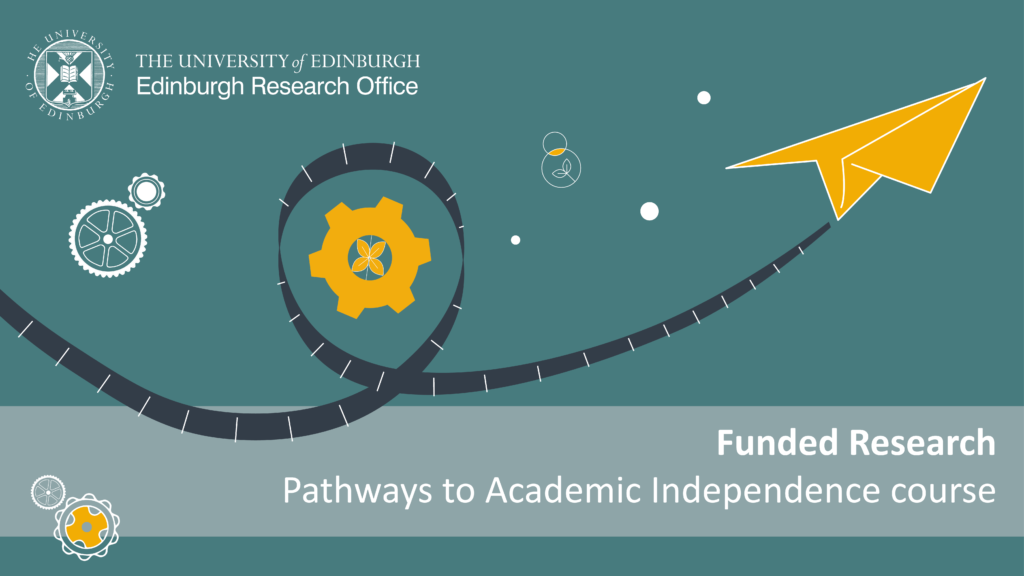In this post Al Innes and Dr Charlotte Brady, of the Strategic Research Development Team, introduce the recently launched Pathways to Academic Independence course, a part of the Funded Research programme at the University of Edinburgh.

The course is available to all staff at the University and is discipline-neutral, providing a set of learning modules that will support events led by Edinburgh Research Office and the activity we undertake in proposal development and improving the general skills base of academic researchers.
In this course we also used a framework that you can use to map your own capabilities, in the context of research funding. We’ve covered the Competency Framework for Research Funding in a previous blogpost, so head over there and learn more:
It draws on expertise and resources from a number of organisational units from across the University, including Edinburgh Research Office, as well as the Institute for Academic Development; Edinburgh Innovations; College Research Offices, and was user-tested with a number of early-career research academics and professional services staff. The new course complements existing resources designed to support Research Leaders and cohorts of Experienced Researchers – supporting Aspiring Researchers to foster and develop the skills needed to become externally-funded grant holders in their research field. These include general research management skills appropriate for funding applications and specific research funding skills.
Cultivating Success: Planning for Research Excellence
The first module of the course addresses a common challenge faced by researchers – time management and planning. Whether you’re an academic or a technician, carving out time for planning often takes a backseat. This module seeks to change that narrative. It highlights the significance of dedicating time to strategise research activities and funding. The module emphasises that an effective proposal doesn’t start with selecting a scheme or funder; it begins by understanding your research landscape and capabilities. This understanding helps you identify the funding avenues that align with your objectives.
Crafting Your Path: A Personal Research Funding Strategy
Building upon the foundations of planning and writing, the second module introduces the concept of a “Professional Research Funding Strategy.” Delve into this module with the understanding that your strategy is the compass that guides your research journey. By meticulously mapping out your research activities, you lay the groundwork for future funders and funding mechanisms. This strategic approach reduces the time spent explaining your research during conversations and minimizes the challenges of rewriting unsuccessful applications or transitioning to new schemes.
This module invites you to ponder the grand vision of your research aspirations, explore potential stakeholders, and envision the impact of your research. It guides you through the process of crafting a research strategy tailored to your unique trajectory. Not only does this exercise shape a long-term perspective for your career, but it also hones your ability to articulate your goals effectively. Your skill in presenting your intentions becomes invaluable in engaging with potential funders.
Navigating Funding Complexities: The Landscape Module
Funding success hinges on familiarity with funders aligned with your discipline. The third module, “Funding Landscape,” illuminates the path toward securing funding that resonates with your research goals. Delve into funders’ strategic plans, understand the nuances of their funding calls, and align your research with their priorities. This meticulous approach enhances your chances of securing funding that complements your vision.
This module serves as a bridge, connecting you to the research funding mechanics introduced in earlier segments. It provides insight into the intricacies of research funding, crucial for sustaining your scholarly journey.
What is the expected time commitment for the course?
There’s a lot of stuff in the course and everyone has different time limits and commitments, so it’s designed for researchers to dip in and out of. The estimated length of time required to take the online course is about 6 hours. You may wish to break this up into bitesize chunks over time, or block off two half-days for the course. Because some activities are about reflection we would suggest not trying to complete the course in one sitting.
Enrol in Your Academic Odyssey
Access the “Funded Research: Pathways to Academic Independence” course through the Learning Catalogue on People and Money. Search for “Funded Research” or access the course directly below:
It is envisioned that the Pathways to Academic Independence will support interactions with academic staff and research offices across the University, by providing skills and training that can be embedded in existing development activity and staff induction.
Prepare to explore the rich landscapes of planning, strategy crafting, and funding complexities. As you set foot on the pathways to academic independence, consider this course a compass guiding you toward a future of research excellence.



